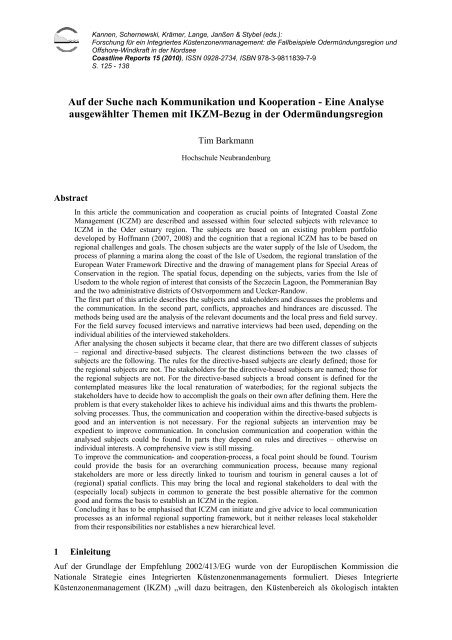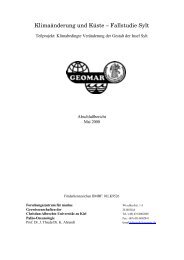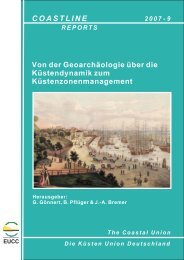COASTLINE - Büro für Umwelt und Küste
COASTLINE - Büro für Umwelt und Küste
COASTLINE - Büro für Umwelt und Küste
Sie wollen auch ein ePaper? Erhöhen Sie die Reichweite Ihrer Titel.
YUMPU macht aus Druck-PDFs automatisch weboptimierte ePaper, die Google liebt.
Kannen, Schernewski, Krämer, Lange, Janßen & Stybel (eds.):<br />
Forschung für ein Integriertes Küstenzonenmanagement: die Fallbeispiele Odermündungsregion <strong>und</strong><br />
Offshore-Windkraft in der Nordsee<br />
Coastline Reports 15 (2010), ISSN 0928-2734, ISBN 978-3-9811839-7-9<br />
S. 125 - 138<br />
Auf der Suche nach Kommunikation <strong>und</strong> Kooperation - Eine Analyse<br />
ausgewählter Themen mit IKZM-Bezug in der Odermündungsregion<br />
Tim Barkmann<br />
Hochschule Neubrandenburg<br />
Abstract<br />
In this article the communication and cooperation as crucial points of Integrated Coastal Zone<br />
Management (ICZM) are described and assessed within four selected subjects with relevance to<br />
ICZM in the Oder estuary region. The subjects are based on an existing problem portfolio<br />
developed by Hoffmann (2007, 2008) and the cognition that a regional ICZM has to be based on<br />
regional challenges and goals. The chosen subjects are the water supply of the Isle of Usedom, the<br />
process of planning a marina along the coast of the Isle of Usedom, the regional translation of the<br />
European Water Framework Directive and the drawing of management plans for Special Areas of<br />
Conservation in the region. The spatial focus, depending on the subjects, varies from the Isle of<br />
Usedom to the whole region of interest that consists of the Szczecin Lagoon, the Pommeranian Bay<br />
and the two administrative districts of Ostvorpommern and Uecker-Randow.<br />
The first part of this article describes the subjects and stakeholders and discusses the problems and<br />
the communication. In the second part, conflicts, approaches and hindrances are discussed. The<br />
methods being used are the analysis of the relevant documents and the local press and field survey.<br />
For the field survey focused interviews and narrative interviews had been used, depending on the<br />
individual abilities of the interviewed stakeholders.<br />
After analysing the chosen subjects it became clear, that there are two different classes of subjects<br />
– regional and directive-based subjects. The clearest distinctions between the two classes of<br />
subjects are the following. The rules for the directive-based subjects are clearly defined; those for<br />
the regional subjects are not. The stakeholders for the directive-based subjects are named; those for<br />
the regional subjects are not. For the directive-based subjects a broad consent is defined for the<br />
contemplated measures like the local renaturation of waterbodies; for the regional subjects the<br />
stakeholders have to decide how to accomplish the goals on their own after defining them. Here the<br />
problem is that every stakeholder likes to achieve his individual aims and this thwarts the problemsolving<br />
processes. Thus, the communication and cooperation within the directive-based subjects is<br />
good and an intervention is not necessary. For the regional subjects an intervention may be<br />
expedient to improve communication. In conclusion communication and cooperation within the<br />
analysed subjects could be fo<strong>und</strong>. In parts they depend on rules and directives – otherwise on<br />
individual interests. A comprehensive view is still missing.<br />
To improve the communication- and cooperation-process, a focal point should be fo<strong>und</strong>. Tourism<br />
could provide the basis for an overarching communication process, because many regional<br />
stakeholders are more or less directly linked to tourism and tourism in general causes a lot of<br />
(regional) spatial conflicts. This may bring the local and regional stakeholders to deal with the<br />
(especially local) subjects in common to generate the best possible alternative for the common<br />
good and forms the basis to establish an ICZM in the region.<br />
Concluding it has to be emphasised that ICZM can initiate and give advice to local communication<br />
processes as an informal regional supporting framework, but it neither releases local stakeholder<br />
from their responsibilities nor establishes a new hierarchical level.<br />
1 Einleitung<br />
Auf der Gr<strong>und</strong>lage der Empfehlung 2002/413/EG wurde von der Europäischen Kommission die<br />
Nationale Strategie eines Integrierten Küstenzonenmanagements formuliert. Dieses Integrierte<br />
Küstenzonenmanagement (IKZM) „will dazu beitragen, den Küstenbereich als ökologisch intakten




